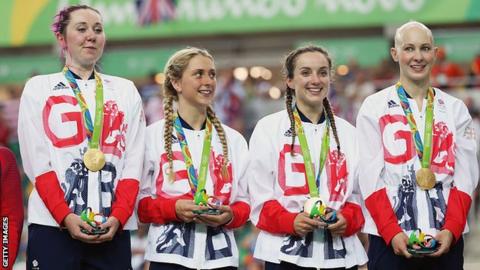
Sporting governing bodies must bring in more women or lose public funding, UK Sport and Sport England have warned.
Under the new ‘Code for Sports Governance’, organisations must adhere to “gold standards” of transparency, accountability and financial integrity.
The code sets out a target of at least 30% gender diversity on boards.
“If sport wants to be publicly funded, it must reflect the public it serves,” said the chief executive of Women in Sport, Ruth Holdaway.
She said the code sent that message “loud and clear”.
The code calls for:
- Increased skills and diversity in decision-making, with a target of at least 30% gender diversity on boards
- Greater transparency, for example publishing more information on the structure, strategy and financial position of the organisation
- Constitutional arrangements that give boards the prime role in decision-making
The new code applies to governing bodies who ask for UK government and National Lottery funding from April 2017.
UK Sport predicts changes in practice should be in evidence by the 2020 Tokyo Olympics.
“It is vital that our domestic sports bodies and organisations uphold the very highest standards of governance and lead the world in this area,” sports minister Tracey Crouch said.
It is not only funding which could be hit if authorities do not comply with the code.
The government could also take other punitive measures – including the withdrawal of the support sporting bodies need when bidding to host major events.
Who benefits from the funding at present?
Both UK Sport and Sport England allocate money from the government and National Lottery to grassroots initiatives, clubs, charities, local authorities and national governing bodies.
Sport England is investing £493m into 46 sports between 2013 and 2017 while UK Sport has invested about £350m in the same period.
The Football Association is among the many recipients and will receive £30m from Sport England during the period 2013-2017.
However, the sports minister warned the FA earlier this year that it would be stripped of further funding unless it made changes to its governance.
The FA has just one woman on its board, independent non-executive director Dame Heather Rabbatts, who has been left “frustrated” and “disappointed” at its failure to implement reform.
However, FA chairman Greg Clarke welcomed the new code, saying: “It will rightly protect public investment in sport by ensuring that transparency, controls and financial probity are a prerequisite for all organisations in receipt of government money.”
British Cycling, the England and Wales Cricket Board, the Lawn Tennis Association, UK Athletics and UK Gymnastics are other recipients of funding, along with many Olympic and Paralympic sports.
What will governing bodies have to do now?
UK Sport’s chief operating officer Simon Morton told BBC Sport: “This code includes over 50 requirements that sporting organisations in receipt of public funding will now have to implement.
“It will take different times for every single organisation. They all have different constitutions in place, so we’ll agree bespoke timescales.
“But certainly as we move into the next funding cycle, which will start from 2017 onwards, they’ll need to be compliant with these standards.
“Sports bodies have already done well in governance terms, but there’s a huge amount of public funding going into sport and the key message is [for them] to justify the funding, give the public confidence that the governance of sport is right.”
How has the new code come about?
The government announced a new code would be developed in its Sporting Future strategy, published in December 2015.
In response, UK Sport and Sport England embarked on a consultation period with governing bodies and found strong support for higher standards of governance.
Of the more than 200 organisations consulted, 98% backed a drive for greater transparency and 78% agreed on the need for increased diversity.
“There have been significant improvements in standards of governance, which is to be welcomed, but there is still much to do,” Sport England chair Nick Bitel said.
“Diversity in sports sector boardrooms is still an issue and requires a mandatory code to achieve sustainable change.”
UK Sport chairman Rod Carr added: “We are confident that despite the recent historic successes at the Rio 2016 Olympic and Paralympic Games, we can be even stronger as a high-performance system with better representation and more openness.
“This is also about encouraging more diversity into leadership positions in sport, and I fully expect to see a broad range of talent coming in to key roles during the Tokyo cycle.”
Analysis
Dan Roan, BBC sports editor
This could be very serious for governing bodies like the FA. As well as cutting investment through its funding agencies for sports who fail to reform, the government is prepared to withdraw essential support and guarantees required for bids to host major international events.
That could mean the FA’s plans to bid for the 2030 World Cup are blocked, if it refuses to modernise.
Very few British governing bodies currently meet the new governance criteria, so this code represents a significant change in the way sports are run. UK Sport is also considering the establishment of a compliance unit to conduct investigations into governing bodies.



